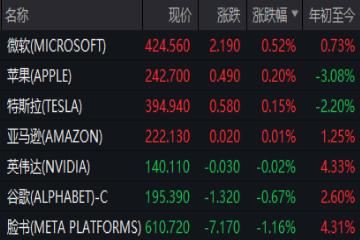The financial landscape on the East Coast of the United States was characterized by an ambiguous day in the stock market, as the three major indices exhibited mixed resultsThe Dow Jones Industrial Average managed to gain a modest 106.84 points, translating into a 0.25% increase, closing at 42,635.20 pointsIn contrast, the Nasdaq Composite faced a slight decline, retreating by 10.80 points or 0.06%, ending at 19,478.88 pointsMeanwhile, the S&P 500 settled with an increase of 9.21 points or 0.16%, wrapping up the session at 5,918.24 pointsThis lack of a definitive trading direction has been attributed to the prevailing complexities in economic data and uncertainties surrounding fiscal policy, leading to a cautious sentiment among investors.
However, a notable development occurred within the quantum computing sector, where the 'super track' of the US stock market experienced a significant downturn
Advertisements
Major tech stocks painted a mixed picture as wellMeta Platforms saw a downturn with a fall of 1.16%, whereas Alphabet Inc(Google A) decreased by 0.79%. Nvidia saw a negligible drop of 0.02%, while Amazon's shares witnessed a slight uptick of 0.01%. Tesla experienced mild growth, increasing by 0.15%, and Apple also saw a rise of 0.2%. Microsoft showed a bit more strength with a 0.52% gainA standout in the day’s trading was eBay, which surged by about 10% after Meta announced it would showcase items from eBay’s competitors on its Facebook Marketplace.
The quantum computing space faced turmoil following comments from Nvidia's CEO, Jensen HuangHis remarks suggested that truly “useful” quantum computers might not arrive for several decades, which sparked a sell-off among quantum computing-related stocksIonQ found itself down by a staggering 39%, while Quantum Computing dropped 43%, and Rigetti Computing plummeted 45%. These stock movements illustrate the enormous impact that executive sentiments can have on investor confidence and market stability.
In the realm of Chinese stocks listed on NASDAQ, the situation was also bleak
Advertisements
The NASDAQ Golden Dragon China Index fell by 0.67%, and among popular stocks, Xpeng Motors tumbled by over 5%, with rivals NIO and Kingsoft Cloud dipping by more than 4%. Bilibili followed suit with a drop exceeding 3%. Conversely, while some stocks struggled, educational technology firm TAL Education saw a rise of over 5%, and NetEase gained more than 2% as a silver lining amid the broader declines.
Across the Atlantic, European markets experienced significant fluctuationsThe UK's FTSE 100 index ticked up slightly, whereas indices like France's CAC40, Germany's DAX, and the pan-European STOXX50 all saw marginal declinesIn commodity trading, spot gold rose by 0.17%, settling at $2,653.27 per ounce, while both Brent crude and US crude oil prices saw increases exceeding 0.4%.
The Federal Reserve's concerns over inflation were laid bare in the release of the minutes from their December monetary policy meeting, becoming a catalyst for market volatility
Advertisements
The discussion revealed a consensus among nearly all Fed decision-makers regarding heightened risks associated with inflationAmong the various policy proposals considered, the possibility of increased tariffs was a significant area of anxiety, as officials recognized that such measures could potentially influence short-term inflationary trends.
Additionally, as discussions progressed about the future trajectory of monetary policy, officials pointed toward an approaching moment suitable for slowing the pace of policy easingThis shift in communication suggested that future rate cuts might proceed at a more measured pace, ushering in a more cautious approach to monetary policySuch revelations intensified worries that the reductions in interest rates anticipated for 2025 could fall short of expectations, further impacting the equity markets.
Further complicating the economic picture, data released by ADP indicated that the private sector in the United States created fewer jobs than expected in December
- US Stocks Decline Across Key Sectors
- AI, Innovation Fuel Industrial Revival
- Nvidia on Quantum Computing: A Misunderstanding?
- Can Digital RMB End the Dollar's Dominance?
- Major Indices Mixed as Volume Dips Below 500B
Wage growth also decelerated to the slowest pace observed in nearly three and a half yearsWhile signs suggest that hiring is decelerating, there remains a lack of evidence indicating a spike in layoff ratesAccording to data from the U.SDepartment of Labor, initial claims for unemployment insurance stood at 201,000 for the week ending on January 4, marking the lowest level since February 2024.
Bond markets were not immune to these dynamics, with the yield on the 10-year Treasury note rising to 4.691%, while the 30-year Treasury yield hit 4.931%, the highest levels since November 1, 2023. The steep incline in bond yields could introduce instability in the stock market, as higher borrowing costs for businesses and consumers could dampen economic growthMoreover, as the yield on government bonds rises, riskier assets like stocks could face downward pressure as investors seek safer returns.
Investor anxiety has also been exacerbated by concerns surrounding potential trade policies, particularly regarding the possibility of additional tariffs on trade partners

This uncertainty linked to the incoming administration has fostered a nervous atmosphereThomas Hayes, chairman of Great Hill Capital LLC, articulated that broader tariffs could exert short-term inflationary effects, calling into the spotlight the Fed's vigilant monitoring of these policy actionsCuts in government spending could, to some extent, alleviate the inflationary pressures instigated by tariff strategies.
Moreover, distressing reports surrounding the rampant wildfires in California have further influenced market sentimentForecasts of strong winds have raised fears of uncontrollable fires, leading to a significant drop of 10% in Edison International's stock, marking the worst single-day performance since 2020. Experts have pointed to the increasing scale and frequency of these wildfires over recent years as a major contributing factor to escalating lossesThe wildfires occurring this week could potentially hasten a trend of insurance companies withdrawing from the California market, further modifying the landscape of insurance in the state.
Leave A Reply